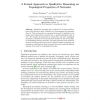278 search results - page 10 / 56 » Reasoning About General Games Described in GDL-II |
ATAL
2004
Springer
14 years 24 days ago
2004
Springer
We introduce a Game Logic with Preferences (GLP), which makes it possible to reason about how information or assumptions about the preferences of other players can be used by agen...
EKAW
2006
Springer
13 years 9 months ago
2006
Springer
Abstract. Qualitative reasoning uses a limited set of relevant distinctions of the domain to allow a flexible way of representing and reasoning about it. This work presents a conce...
GECCO
2008
Springer
13 years 8 months ago
2008
Springer
In the course of the recent complexification and sophistication of commercial computer games, the creation of competitive artificial players that are able to behave intelligentl...
ECAI
2010
Springer
13 years 7 months ago
2010
Springer
We introduce and study higher-order coalition logic, a multi modal monadic second-order logic with operators [{x}] expressing that the coalition of all agents satisfying (x) can ac...
ATAL
2009
Springer
14 years 2 months ago
2009
Springer
Alternating-time temporal logic (atl) is one of the most influential logics for reasoning about agents’ abilities. Constructive Strategic Logic (csl) is a variant of atl for im...

